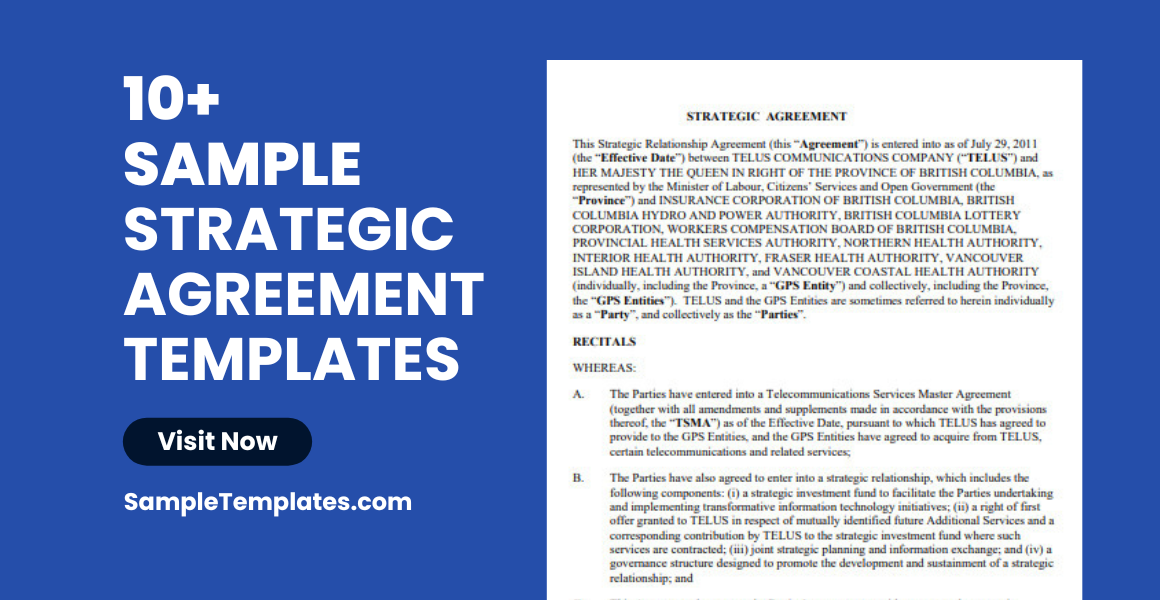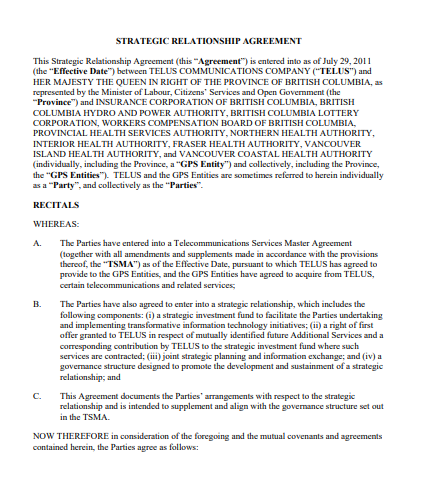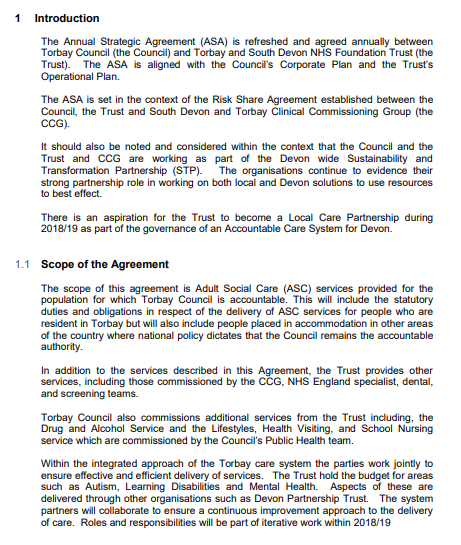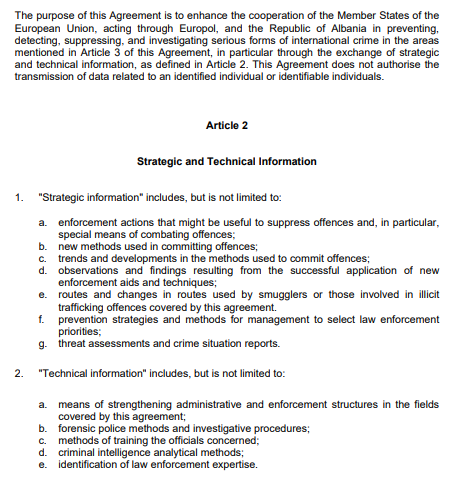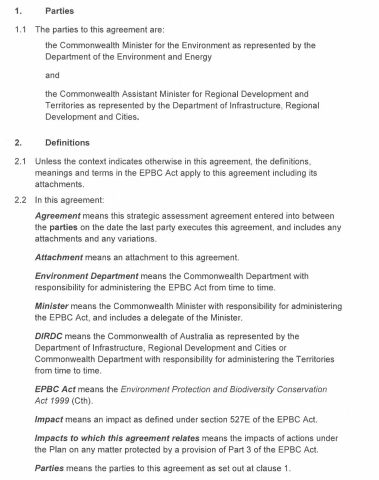1. Sample Strategic Alliance Agreement Template

2. Sample Strategic Supply Agreement Template
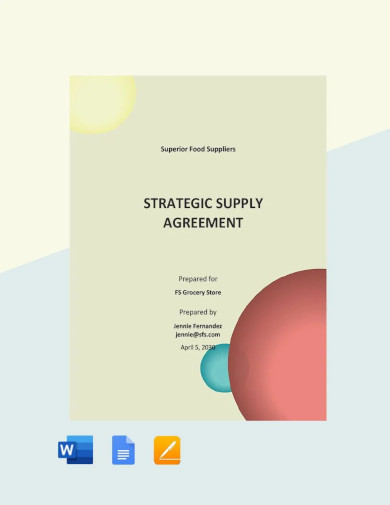
3. Sample Strategic Business Partnership Agreement Template
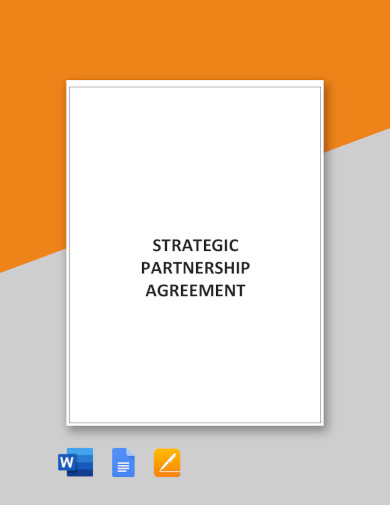
4. Sample Strategic Cooperation Agreement Template
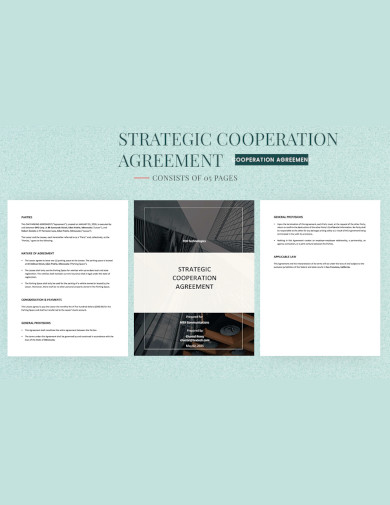
5. Sample Strategic Consulting Agreement Template
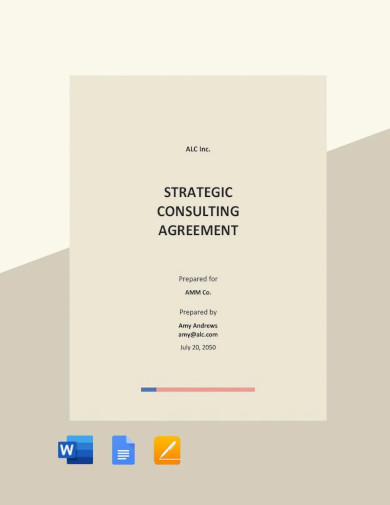
What is Strategic Agreement?
A strategic agreement, often pivotal in the realms of business and organizational partnerships, is a formalized pact between two or more parties. It sample outlines a shared vision and objectives, aiming to leverage mutual strengths for collective benefits. Unlike standard contracts, strategic agreements emphasize collaboration and long-term mutual growth.
Understanding the Essence of Strategic Agreements
At its core, a strategic agreement is more than just a legal document; it’s a roadmap for synergy. It involves aligning goals, resources, and efforts to achieve outcomes that might be unattainable individually. These sample agreements can take various forms, such as joint ventures, partnerships, or alliances, and are common in industries ranging from technology to healthcare.
Importance of Strategic Agreement
Strategic agreements play a crucial role in the business world, offering numerous benefits that can significantly impact the growth and success of the involved organizations. Here are some key points highlighting their importance:
- Access to New Markets and Resources: Strategic agreements allow companies to tap into new markets and access resources that might otherwise be unavailable. This can include technology, expertise, or specific market knowledge, which can be vital for expansion and growth.
- Cost Reduction and Efficiency: By collaborating, companies can share the costs and risks associated with new ventures, research and development, or market expansion. This shared sample investment can lead to greater efficiency and cost savings.
- Enhanced Innovation and Competitiveness: When organizations with different backgrounds and specialties come together, it fosters an environment ripe for innovation. This collaboration can lead to the development of new products, services, or processes, giving the involved parties a competitive edge in their respective industries.
- Risk Mitigation: Strategic agreements can spread and mitigate risks, especially in high-stakes projects or investments. By sharing the burden, companies can pursue ambitious goals with a safety net that individual entities might not have.
- Learning and Development: These agreements often create opportunities for learning and development. Companies can learn from each other’s strengths, management styles, and operational tactics, leading to overall improvement and growth.
- Building Long-Term Relationships: Strategic agreements often lead to long-term partnerships and relationships. These relationships can be invaluable, providing stability, reliability, and ongoing support in various business endeavors.
- Flexibility: Compared to mergers or acquisitions, strategic agreements offer more flexibility. Parties can collaborate in specific areas while remaining independent, allowing them to adapt and change course as needed without complex structural changes.
- Global Expansion: For companies looking to expand globally, strategic agreements with local partners can provide essential insights into the local market, culture, and regulations, making the expansion process more manageable and successful. You can also see more templates like Sample Business Partnership Agreements.
Key Components of a Strategic Agreement
- Objective Alignment: The agreement begins with a clear articulation of shared goals. Whether it’s market expansion, product development, or research collaboration, the sample objectives should be specific, measurable, and achievable.
- Roles and Responsibilities: Each party’s role is clearly defined to avoid overlaps and ensure efficiency. This clarity fosters a sense of ownership and accountability.
- Resource Sharing: Strategic agreements often involve pooling resources like technology, expertise, or capital. This collaboration can lead to innovative solutions and accelerated growth.
- Risk and Reward Sharing: Parties in a strategic agreement share not just resources but also risks and rewards. This mutual stake in both potential gains and losses fosters a deeper commitment to the partnership’s success.
- Duration and Exit Strategy: The agreement outlines its lifespan and includes provisions for renewal or termination. An exit strategy is crucial for addressing scenarios where the partnership may no longer be viable.
Delving Deeper into Strategic Agreements
Strategic agreements are multifaceted and can vary in form, ranging from joint ventures and alliances to comprehensive partnership agreements. They are particularly prevalent in sectors where innovation, market expansion, and resource sharing are key to staying competitive, such as in technology, healthcare, and international trade.
Core Elements of a Strategic Agreement
- Shared Vision and Goals: The foundation of any strategic agreement is a set of clearly defined, aligned objectives. These goals should be ambitious yet attainable, providing a clear direction for the partnership.
- Defined Roles and Responsibilities: A successful strategic agreement delineates the responsibilities of each party. This clarity helps in avoiding confusion, ensuring that each entity knows what is expected of them.
- Resource Allocation: One of the primary benefits of a strategic agreement is the pooling of resources – be it technology, expertise, financial investment, or manpower. This collective approach often leads to more efficient and innovative outcomes.
- Risk and Reward Management: In a strategic agreement, all parties share the risks and rewards. This shared stake in both the potential successes and challenges fosters a stronger commitment to the partnership’s objectives.
- Governance and Decision-Making: Establishing clear governance structures is crucial. This includes decision-making processes, conflict resolution mechanisms, and regular communication channels.
- Flexibility and Adaptability: The business world is dynamic, and strategic agreements must be adaptable to changing circumstances. Flexibility in the agreement allows the parties to evolve and grow together.
- Duration and Termination Clauses: The agreement should specify its duration, with provisions for renewal or termination. An exit strategy is essential for addressing situations where the partnership may no longer be beneficial or viable. You can also see more templates like Co-Branding Agreement Samples.
Types of Strategic Agreements
- Joint Ventures: This involves two or more businesses coming together to form a new entity, sharing resources, risks, and rewards proportionately.
- Partnerships: Typically less formal than joint ventures, partnerships involve collaboration while each party maintains its separate identity.
- Mergers and Acquisitions (M&A): These are more complex forms of strategic agreements where one company takes over or merges with another to enhance its competitive edge.
- Licensing Agreements: Here, a company permits another to use its intellectual property, like patents or trademarks, in exchange for a fee or royalty.
- Franchising: In this model, one business allows another to operate using its brand and business model, often seen in retail and service industries.
Benefits of Strategic Agreements
- Resource Optimization: By sharing resources, companies can reduce costs and optimize their use.
- Market Access: Strategic agreements can open new markets or segments that were previously inaccessible.
- Innovation Boost: Collaboration often leads to innovative solutions and products.
- Risk Mitigation: Sharing the risks with another entity can make new ventures more manageable.
Challenges and Considerations
While strategic agreements offer numerous benefits, they also come with challenges. Cultural differences, misaligned objectives, and communication barriers can hinder the success of these agreements. Therefore, clear communication, aligned goals, and a thorough understanding of each party’s expectations are crucial. You can also see more templates like Sample Partnership Agreements.
6. Sample Strategic Relationship Agreement Template
7. Sample Annual Strategic Agreement Template
8. Sample Strategic Mandate Agreement Template
9. Sample Basic Strategic Agreement Template
10. Sample Strategic Agreement Template
11. Sample Strategic Assessment Agreement Template
How do You Create a Strategic Agreement?
Creating a strategic agreement is a meticulous process that requires careful sample planning, negotiation, and alignment of interests. Here’s a step-by-step guide:
- Identify Potential Partners: Look for organizations or individuals whose goals align with yours and who bring complementary strengths to the table.
- Initial Discussions: Engage in exploratory talks to gauge mutual interest and potential areas of collaboration. This stage is about understanding each other’s capabilities and objectives.
- Draft a Preliminary Agreement: Outline the key terms, objectives, and scope of the partnership. This document serves as a foundation for more detailed negotiations.
- Negotiate Terms: This crucial phase involves hashing out the specifics – responsibilities, resource allocation, governance structures, and conflict resolution mechanisms.
- Legal Review and Finalization: Have legal experts review the agreement to ensure compliance with relevant laws and regulations. Both parties should agree on the final draft before signing.
- Implementation and Monitoring: Once the agreement is in place, focus shifts to execution. Regular meetings and progress reviews help ensure that the partnership stays on track.
- Adaptation and Evolution: Be prepared to adapt the agreement as circumstances change. A successful strategic agreement is flexible enough to accommodate growth and change.
What is a Strategic Collaboration Agreement?
Related Posts
FREE 10+ Mentoring Agreement Samples In MS Word | Apple Pages | PDF
FREE 10+ Partner Agreement Samples In MS Word | Google Docs | Apple Pages | PDF
FREE 10+ Individual Agreement Samples In MS Word | Google Docs | Apple Pages | PDF
FREE 10+ Equity Agreement Samples In MS Word | Google Docs | Apple Pages | PDF
FREE 10+ Producer Agreement Samples in MS Word | Apple Pages | PDF
FREE 10+ Grant Agreement Samples In MS Word | Apple Pages | PDF
FREE 8+ Meeting Agreement Samples in MS Word | Google Docs | Apple Pages | PDF
FREE 10+ Community Agreement Samples In MS Word | Google Docs | PDF
FREE 8+ Real Estate Option Agreement Samples in MS Word | PDF
FREE 10+ Call Option Agreement Samples In MS Word | PDF
FREE 10+ Advertising Agreement Samples In MS Word | Google Docs | Apple Pages | PDF
FREE 10+ Car Agreement Samples In MS Word | Google Docs | Apple Pages | PDF
FREE 10+ Horse Agreement Samples In MS Word | Apple Pages | PDF
FREE 10+ Option Agreement Samples In MS Word | Google Docs | Apple Pages | PDF
FREE 9+ Project Management Agreement Samples in DOC | PDF
